Nowadays, people are very health-conscious and particular about their diets. Fitness enthusiasts focus a lot on their protein intake and opt for high protein diet plans. But why a high-protein diet? Well, protein is an essential macronutrient needed for proper cell growth and functioning of your body. If you are exercising daily, your body may need extra protein to maintain and repair tissues and gain muscle mass.
In this blog, we will discuss about the protein requirements of our body and suggest some food items that you can incorporate in your diet to increase your protein intake. So, let’s get started!
The daily requirement of protein may vary according to age, weight, gender, and level of physical activity. The nutritional value of proteins is measured by the number of amino acids. The recommended daily dose of protein is 46 grams for women and 54 grams for men1.
Proteins are vital for numerous bodily functions, including growth, muscle repair, immune function and the creation of enzymes and hormones. Without enough protein, the body can’t function properly, making it an essential part of a balanced diet.
Protein-rich foods benefit in weight management and aid metabolic health. They help to:
Protein suppresses your hunger by inhibiting hormones like ghrelin which increase appetite and stimulating those that are responsible for satiety. This helps to promote a feeling of fullness and prevents you from eating unnecessarily2.
Protein-rich foods contribute to overall energy levels and help maintain strength, making them an essential part of a balanced diet, especially for individuals with active lifestyles. These foods help in preserving the fat-free mass of the body which contributes to enhanced energy levels2.
Protein is considered the building block of muscles. Consuming adequate protein is particularly important for those engaged in strength training or resistance exercises to support muscle growth and repair.
Some studies3 have revealed that a diet rich in protein, especially animal protein may have a positive effect on bone mass density. Thus, a diet rich in protein can help lower the risk of fractures and osteoporosis, however, further research is needed to confirm this benefit.
Eating protein boosts your metabolism and may help you to burn excess fat faster. It also aids in weight loss by increasing the levels of amino acids in blood and enhancing utilization of glucose and fats2.
Incorporating a variety of protein sources into your diet may help reduce the risk of high blood pressure. Studies4 have shown that diets rich in diverse proteins, especially when combined with high fibre intake, are associated with lower blood pressure levels and a reduced risk of hypertension.
Protein is the building block of organs and tissues and so it helps promote recovery after exercise and injury. However, in case of any injuries, it’s important to follow doctor’s advice and recommendations on the appropriate diet for you.
One of the many effects of ageing is sarcopenia which is responsible for bone fractures, frailty and an overall lowered quality of life. Protein slows down the process of muscle deterioration and protects you from early sarcopenia.
According to the recommendations of the National Academy of Medicine, it is important for adults to consume a minimum of 0.8 grams of protein for every kilogram of body weight per day. This means that for every 20 pounds of body weight, you should aim to consume just over 7 grams of protein14.
Dr. Rajeev Singh, BAMS
Different foods contain different proteins, which have various roles in our body. There are 9 essential amino acids (units that form proteins) which are not naturally found in the body. Hence, we need to include foods in our diet to get these proteins for our bodies. Here are some high protein food options for you.
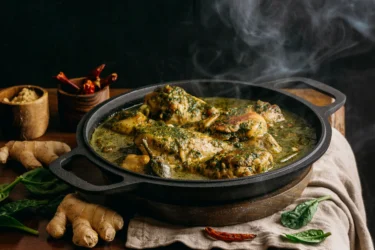
Boneless and skinless chicken breasts are one of the common and richest sources of protein. Bodybuilders and athletes usually include chicken breasts in their diet because it does not have saturated fat. Chicken breast contains approximately 21 to 22 grams of protein per 100 grams5.
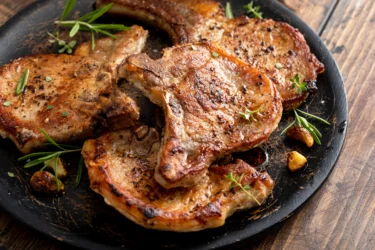
The pork tenderloin is considered as an extra-lean chop which is rich in proteins and has low-fat levels. 100 grams of pork contain approximately 20 grams of protein5.
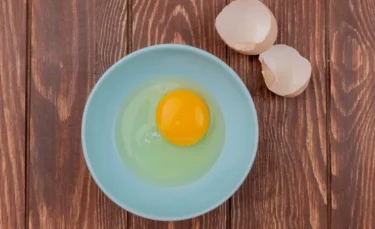
It is one of the excellent protein sources for ‘eggetarian’ people who do not eat meat or seafood. Egg contains almost all essential amino acids which are necessary for protein formation. You always think that egg yolk is more nutritious than egg white but that’s not true. Egg white is a pure form of protein than egg yolk with less saturated fat. Four egg whites have almost 14 to 15 grams of protein6.
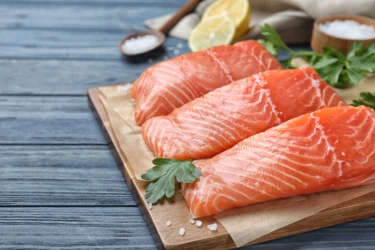
Seafood is a rich source of proteins with a lot of health benefits. Fish, like salmon, contain about 20 to 21 grams of proteins and usually have low fat5.
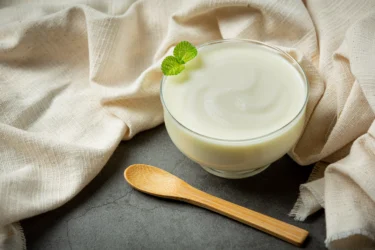
Greek yogurt is one of the tasty sources of proteins. It provides on average of 10 grams of protein in 100 grams7. Greek yogurt is more concentrated than regular yogurt hence it contains more proteins. Also, better to choose a plain Greek yogurt than a flavoured one as it may contain more carbohydrates and sugar.
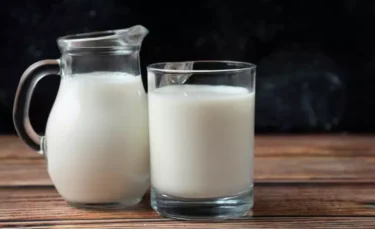
Milk is always considered as a complete food as it is full of proteins, carbohydrates, vitamins, calcium, minerals, etc. But always choose skimmed milk as it has more proteins and no fats and carbohydrates. It keeps your bones and teeth healthy and helps avoid the risk of osteoporosis. 1 cup (250 ml) of skimmed milk provides 8 to 10 grams of protein8.
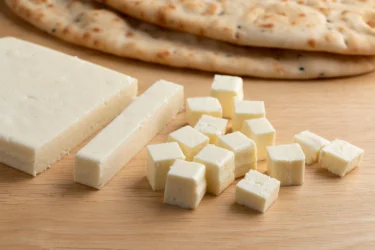
Paneer is great alternative to chicken for vegetarians. It is a rich source of casein protein. Paneer has 18 to 20 grams of protein per 100 grams5.
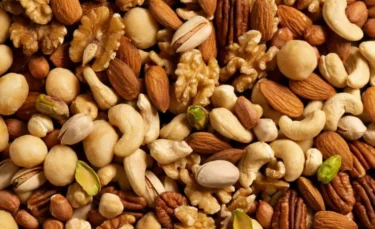
Nuts such as groundnuts, almonds, and peanuts are rich in proteins, unsaturated fats, and satiating fibres. They are slow-burning foods which keep your stomach full for a longer time and help reduce your cravings. ¼ cup (around 20 grams) of peanuts or almonds provide 5 to 6 gram of protein5,8.
Nut butters such as peanut butter and almond butter are also some newer healthy products that you can opt for. These are high in proteins, potassium, and fibres.
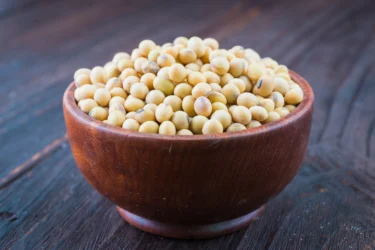
Soybean is also known as “meat without bones” because of its protein richness. It is available in various forms like soy yogurt, soya milk, roasted soybeans, etc. It is a great source of protein with very low fats. It contains 37 grams of protein per 100 grams5. Soybean is a great alternative for vegetarians and lactose-intolerant people.
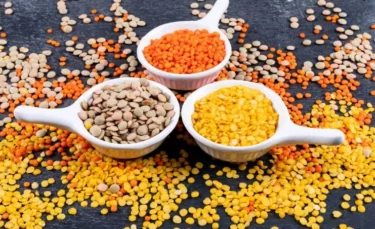
Lentils are also excellent for proteins for vegetarians. Both brown and yellow lentils contain about 22 to 24 grams of protein per 100 grams5.
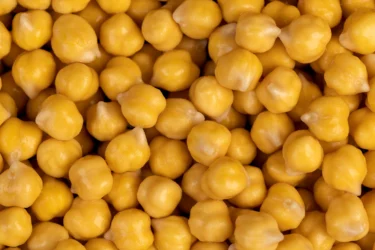
Chickpea curry is a common dish on Indian plates. It is one of the easiest protein-rich food available in India. Chickpeas are low in fat and high in proteins. It offers 20 to 23 grams of protein per 100 grams of chickpeas5.
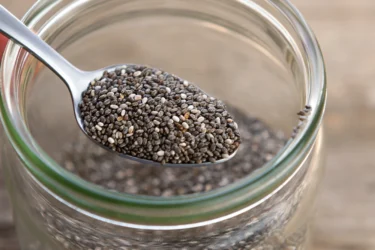
Seeds such as pumpkin seeds, sunflower seeds, chia seeds, hemp seeds, flax seeds are full of proteins. It also contains omega-3 fatty acids which are good for your immunity and heart and liver health. On an average 28g seeds provide around 6 to 9 grams of protein9.
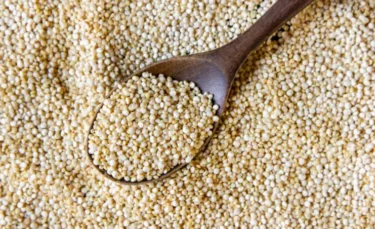
Quinoa is a gluten-free, plant food that is packed with all essential amino acids. There are 6 to 13 grams of proteins in 100 grams of Quinoa5.
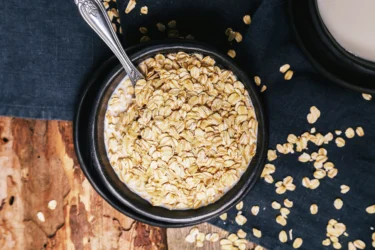
Oats are the new superfood for health-conscious people. They are an excellent source of protein. They contain 12 to 13 grams of protein per 100 grams10.
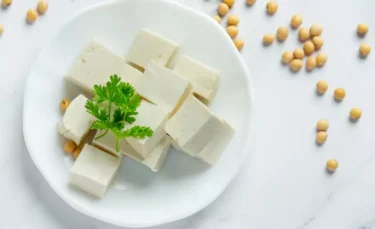
Tofu is full of proteins as it is prepared from soy milk. It also contains magnesium, copper, zinc, and vitamin B1. It is gluten-free and low in calories and helps with weight management. It contains around 8 grams of protein per 100 grams11.
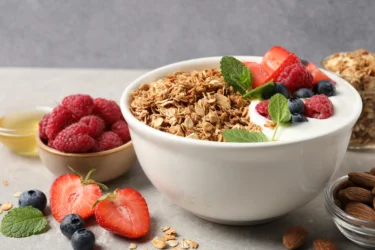
Granola is a healthy cereal that helps you lose weight when you pick a version that’s high in fibre. You can either consume a granola bar or have granola like cereal by mixing it with milk or Greek yoghurt for a high-powered yet light breakfast, perfect for hot summer months. A granola bar (100 grams) provides you with around 10 grams of protein12.
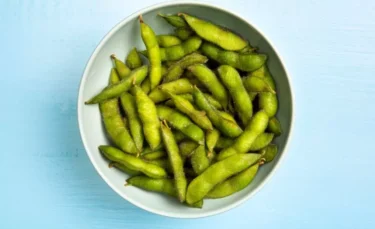
Edamame beans are high in protein and contain amino acids essential for the human body. About 100 grams of edamame beans offer around 11 to 12 grams of protein13. A medium-sized bowl of lightly cooked edamame beans pairs well with roti or rice.
Surprisingly, plant-based foods are actually the leading source of protein worldwide. They make up 57% of the daily protein intake, while meat only contributes 18%. This means that foods like legumes, grains, nuts and seeds play a significant role in meeting our protein needs15.
Dr. Smita Barode, B.A.M.S, M.S.
While protein is essential for the body, excessive protein consumption, particularly from animal may have some side effects. Too much protein can cause uncomfortable digestive symptoms like constipation or diarrhoea. It may also lead to kidney strain and possibly other health problems. Additionally, a high-protein diet that includes a lot of saturated fat may cause weight gain. Therefore, balanced intake in line with individual needs is typically considered best.
Did you know that a cup of cooked lentils contains approximately 18 grams of protein and 15 grams of fibre? What’s more, lentils are low in saturated fat and sodium, making them a healthy choice for your diet. The high protein content of lentils can support muscle growth and repair, while fibre helps promote digestive health and aids in managing cholesterol levels14.
Dr. Siddharth Gupta, B.A.M.S, M.D (Ayu)
Protein is an important nutrient to keep your body healthy and fit. High protein foods help to keep you energetic and reduce food cravings, thus helping with weight management. There are various protein-rich food sources available around us which can easily be included in our diets, like chicken, egg whites, lentils, nuts, etc. But remember not to overdo it. Discuss with a dietician about your body’s protein needs and consume as per their advice. Also, if you have any medical conditions like kidney disease, consult your doctor about your diet, especially before incorporating any new food item in your routine.
Also Read: 11 Healthy Foods That Can Help You to Gain Weight
Yes, there are plenty of plant-based protein sources. Lentils, chickpeas, tofu, tempeh, quinoa and various nuts and seeds are great examples. By eating a varied and balanced diet, vegetarians and vegans can easily meet their protein needs.
Some healthy and high-protein snacks include Greek yogurt, cottage cheese, hard-boiled eggs, edamame, protein bars or shakes made with whole ingredients and mixed nuts.
Most people can get enough protein from whole foods and don’t need supplements. However, athletes, bodybuilders or those with specific dietary restrictions may benefit from protein supplements such as whey or plant-based protein powders.
Complete proteins contain all nine essential amino acids in the right proportions, while incomplete proteins lack one or more of these amino acids. Animal proteins are usually complete, while many plant proteins are incomplete. However, a varied plant-based diet can provide all essential amino acids, for instance, cereal and pulses combination can give you this.
While protein is indeed vital for muscle growth and repair, its role in the body is multifaceted. It’s also essential for proper immune function, enzyme and hormone production, maintaining healthy skin and hair and much more.
Disclaimer: The information provided here is for educational/awareness purposes only and is not intended to be a substitute for medical treatment by a healthcare professional and should not be relied upon to diagnose or treat any medical condition. The reader should consult a registered medical practitioner to determine the appropriateness of the information and before consuming any medication. PharmEasy does not provide any guarantee or warranty (express or implied) regarding the accuracy, adequacy, completeness, legality, reliability or usefulness of the information; and disclaims any liability arising thereof.
Proteins are an important part of our daily diet. They provide our muscles, cells, and vital tissues with the growth factors that are required to keep them healthy and functioning normally1.
In India, a large proportion of individuals prefer to follow a vegetarian diet. While this is a highly nutritious diet, it can sometimes be low in certain elements such as vitamin B12 and proteins. In clinical practice it is common to see vegetarians with low vitamin B12 levels, but clinical evidence also suggests that people who follow vegetarian diets have a lower incidence of developing heart disease and related complications1,2.
Proteins are made of building blocks called amino acids. Amino acids are essential for cell growth and development throughout our lifetime. Proteins form the basic structure of not just our vital organs, but also our skin, hair, and numerous other important parts of our body. If we consume lesser quantities of protein, we could lose muscle strength and muscle mass and become weaker. For individuals who are recovering from a medical illness, may find it beneficial to have a high protein diet to help in faster recovery3.
The following is a rough summary of daily protein requirements based on weight3,4.
Note that protein requirements will vary on the basis of sex, age, level of physical activity, and other factors like whether you are pregnant or breastfeeding3,5.
Let’s take a look at some of the protein-rich foods that are available to the vegetarians.

Lentils, also called daal, is a popular addition to an everyday meal in India. Each cup of lentils contains about 18 g of protein making it an excellent source of vegetarian protein2,5. Lentils can be had in the form of curries, soups, and are eaten with rotis or rice.
In addition to protein, lentils also contain a good quantity of fibre which can help maintain healthy bacteria within the gut. There is some understanding that regular consumption of lentils may also reduce the risk of developing heart disease and cancer6. However, a small number of individuals who consume lentils on a regular basis may notice excessive flatulence. This is not unique to lentils but is generally seen with a high protein diet7.
Lentils also contain quality antioxidants and numerous minerals which can help protect the cells. You may benefit from having a cup full of lentils every day to get your required dietary amount of protein, but make sure you plan your meals with a healthcare professional to attain maximum benefit.
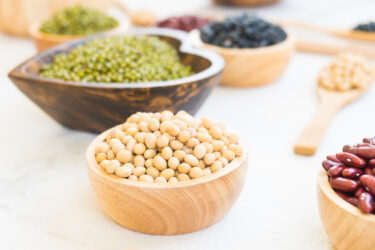
Legumes include varieties of beans such as kidney beans, black beans, chickpeas, and others which are widely considered to be a powerhouse of proteins. Chickpeas contain about 14 g of protein per serving and also contain numerous other elements and minerals that can keep you healthy, strong, and fit2. Clinical studies6 also found that regular consumption of legumes can help keep cholesterol levels low. Chickpeas and other legumes are great in salads or in the form of low-fat, low salt curries5.
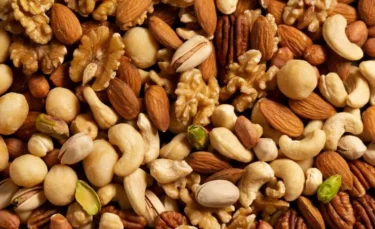
Nuts are superfoods. If follow a good veg protein diet, you should strongly consider adding nuts to the cavalry. Nuts such as almonds and cashew nuts are an excellent source of protein and are always included in the protein foods veg list1.
On average, eating about 20 to 25 whole almonds every day can give you about 6 g of protein2. However, this can be a lot to eat in one go so having a handful of mixed nuts every day may give you the protein boost your body requires. Nuts also contain a good amount of dietary fibre and vitamin E.
If you are looking for a heart-healthy snack and protein-rich food for vegetarians, you can include unsalted nuts as a part of your daily diet after consulting with a healthcare provider1.
We’re about to uncover a fascinating fact about protein one that sets it apart from fats and carbohydrates. Your body relies on protein to build and repair tissues, but unlike the others, protein cannot be stored as a reserve. This means that you may need to provide a continuous supply of protein through your diet to meet your body’s repair and maintenance needs.
Dr. Rajeev Singh, BAMS
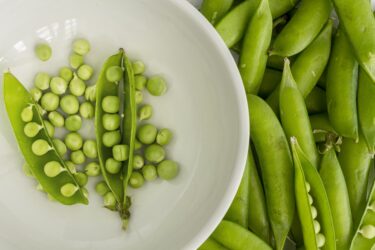
Green peas are an excellent source of protein. A cup full of green peas gives you nearly 8 g of protein2. In addition to this, they are rich in vitamins A, K, and C and also contain numerous minerals and a high quantity of fibre. Simply including green peas in your daily vegetarian diet can help give you the additional protein your body requires1.

Quinoa is considered a food that is healthy, low in fat, and high in protein. Each cup of quinoa can provide around 9 grams of protein and can be beneficial for those who have diabetes2. They are rich in dietary fibre, which can help in keeping the blood sugar levels under control. Their glycaemic index (GI) is 53. Keeping in mind that GI of 55 or below is considered low, quinoa is an ideal food that can be included in a diabetic diet plan. You may refer to the Glycemic Index Food Chart to find out the GI of other foods. Besides these, quinoa also contains a high quantity of complex carbohydrates and numerous minerals. Quinoa is definitely one for the protein foods vegetarian list.
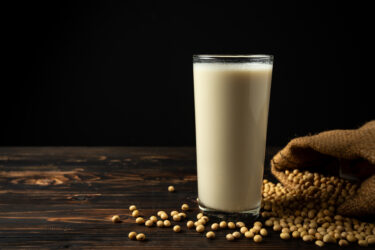
In recent years, soy milk has gained considerable attention as a valuable source of plant-based protein. It is particularly beneficial for individuals with lactose intolerance who require non-dairy protein alternatives. A single cup of soy milk contains approximately 8 grams of protein, making it a nutritionally significant option2. In addition to its protein content, soy milk is also a good source of calcium, vitamin B12, and vitamin D. However, the latter vitamins are usually present in soy milk that has been fortified.
Soy milk can be incorporated into the diet in various ways, such as an additive to tea or coffee, or consumed on its own. It is advisable to opt for unsweetened versions, as sweetened versions, as sweetened varieties may contribute to excess caloric intake and potentially decrease the health benefits of regular consumption.
Additionally, there are several products made from soy other than milk, which are also protein-rich. These include tofu (made from the curd of soy milk), edamame (a preparation made from immature soybeans, boiled or steamed) and tempeh (a fermented preparation native to Java, made in a cake form). These products have similar health benefits to soy milk as they retain their high protein content, and they also provide additional nutrients which are more filling than liquid soy milk. These products not only help to provide your daily requirement of protein but also help manage weight1.
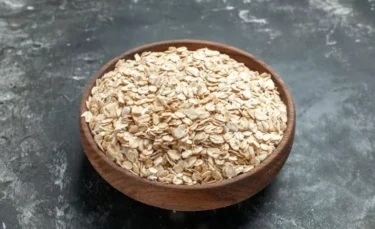
There is no doubt that oats are superfoods. Not only are they high in protein but they are a powerhouse of soluble fibre and clinically proven to help reduce the risk of developing heart disease and to lower cholesterol. A small cup of oats can provide you with nearly 6 g of protein and a quarter of your daily requirement of fibre2. They also help regulate blood sugar levels, owing to their high fibre content and low glycaemic index. You can take a look at the diabetes food chart to find other foods that can help control diabetes better.
Try to avoid masala oats or ready to eat meals as these contain higher quantities of salt or sodium and may not be the healthy start to the day that you hope you will get from them. Instead, buy regular oats and consume them with milk and a spoonful of honey sprinkled with almonds. You could even chop some fruit up into them or add a fistful of berries. You can make the same oats savoury too with a bowl of yoghurt and herbs for taste. A cup full of oats in the morning is a great way to start your day.
Also Read: 8 Most Effective Foods To Fight Thyroid!
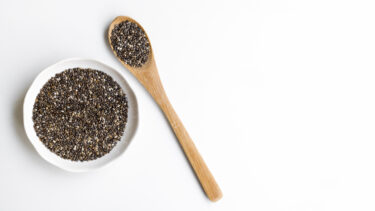
Chia seeds have recently caught on in India and are being used more and more in our country as a superfood. A 35 g serving of Chia seeds contains 6 g of protein and a whopping 13 g of fibre 2. In addition to this, they are also high in nutrients such as calcium, magnesium, and iron and also contain omega-3 fatty acids and numerous antioxidants that can help you stay fit.
Chia seeds are easy to use but make sure that you consume the organic variety. Also, don’t confuse them with basil seeds as they look quite similar to chia seeds. Simply soaking chia seeds in water for a short time and then having them with your favourite beverage can give you the nutritional boost your body deserves. Chia seeds are a great protein source for vegans3.
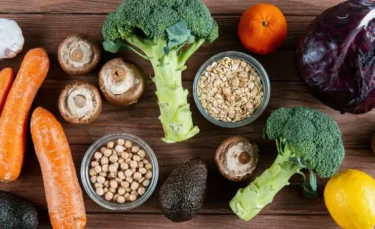
Vegetables are widely considered to just contain vitamins and minerals with a small number of carbohydrates and proteins. However, there are some vegetables that have a greater quantity of protein such as spinach, potatoes, broccoli, asparagus, and even sweet potatoes9. Though the quantity of protein each of these is not comparable to non-vegetarian sources, it still has a significant value of around 5 g of proteins for one cup of cooked vegetables.
It’s time to debunk a common misconception that you need to be non-vegetarian to fulfil your protein requirements. Contrary to popular belief, you can absolutely meet your protein needs through a vegetarian or plant-based diet. Explore the vast array of protein-rich plant foods available and create delicious, nutrient-dense meals that support your health and fitness goals.
Dr. Smita Barode, B.A.M.S, M.S.
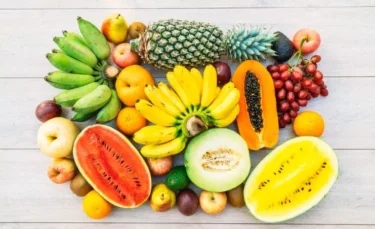
Fruits are generally poorer sources of protein. That being said, fruits such as bananas, guava, and certain berries have a significant amount of protein in them2. However, do not rely on fruits as your primary source of protein instead, choose from one of the options listed earlier in this article.

Edamame is soybeans that have not been fully matured, typically eaten as a side dish in the eastern countries of Asia. Edamame may be found in popular dishes like sushi or can be consumed as a standalone snack/meal. This form of soybean may be cooked and eaten either in the pods or as beans. Due to its simplistic preparation, edamame is a protein-rich vegetarian food that can be easily added to any diet3. Edamame has about 12g of protein per 100g of beans8.
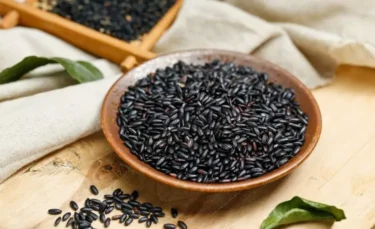
Although not really a species of rice, wild rice is a grain found and grown by the native people of North America and in certain parts of China. This grain is slightly chewy with an almost vegetable-like taste and provides a lot of nutrition including 15%-20% of your daily required zinc and manganese. Wild rice has a protein content of about 14g per serving of 100g, keep in mind that you may eat more than just 100g of wild rice in each meal8. Wild rice may be a great staple protein-rich vegetarian food to add to your diet since it can be consumed regularly (even multiple times a day). You can get diet chart made by a healthcare professional to help you pair wild rice with other dishes to make it more nutritious.
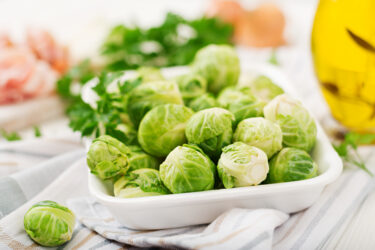
Brussels sprouts are also a good source of protein, in addition to being high in fibre and packed with nutrients, While its protein content of 3-4g per 100g does not make it a competitor to meats and eggs, it is still a high protein-rich option among vegetarian foods8. Add brussels sprouts to your salads for a protein boost, or simply steam or roast them to make it as a wholesome midday meal.
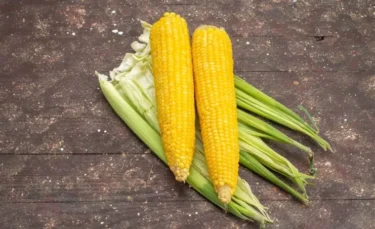
Corn is one of the most cultivated crops today. Corn is used for the production of corn syrup, and cornflour and can also be used as a food source by itself. Sweet corn is a tasty snack to try, whether boiled, steamed or roasted with a delicious slathering of butter on top. Sweet corn has 3.3g of protein content in every 100g serving, with negligible fat and zero cholesterol8.
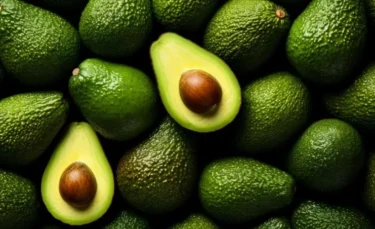
Avocado is a fruit native to North America that has gained popularity as a superfood due to its highly nutritious nature, both in macronutrients and the vitamins and minerals it contains. Although it was initially popularised in Mexican cuisine, avocado is fast becoming a protein-rich vegetarian food for bodybuilding and fitness routines. Avocados can be eaten as is, just sliced up or added to salads and other preparations like guacamole10.
Did you know that approximately one-fifth of your body weight is made up of protein? Yes, you heard it right! Protein is not just a nutrient but a building block for your very existence. It plays a crucial role in the structure and function of every cell and tissue of the body, from your luscious locks and sturdy nails to your life-sustaining blood, resilient skin and robust bones.
Dr. Siddharth Gupta, B.A.M.S, M.D (Ayu)
Also Read: Natural Home Remedies To Reduce Belly Fat
Yes, eating too much protein can put you at risk of developing kidney stones. Those who eat a higher quantity of saturated fat and red meat on a weekly basis are at risk of suffering from various kinds of heart disorders and colon cancer. Ideally, the recommended daily protein intake for men is 56 grams and for women is 46 grams. However, this can vary depending upon your height and weight.
Summer in India can sometimes be uncomfortable. But there are ways to maintain a healthy diet and fitness regime without having to compromise on food. When the heat gets too much, here are some ‘cool’ ways to include protein in your diet:
> Chilled homemade protein shakes
> Raita with your meals
> Watermelon seeds
> Have more lentil soup
To keep yourself fit, warm, and well-cared for during the cold winter months, you may find it benefitting to eat the following protein items:
> Eggs
> Nuts and seeds
> Lentil soup
> Soy
> Chickpea curry
In order to ensure that you are getting your ‘complete protein source’ through your daily meals, you may find it beneficial to add these foods to your diet:
> Amaranth: A type of pseudocereal (a plant that produces seeds or fruits and are used and consumed like cereal grains) that act as an alternative to gluten-free grain originally a staple in Mayan and Aztec cultures.
> Buckwheat: A plant-based pseudocereal that is a good source of manganese, magnesium, iron, copper, and phosphorus.
> Ezekiel Bread: A highly nutritious bread that contains the goodness of nine essential amino acids because it is made from a combination of soybeans, millet, spelt, lentils, wheat and barley.
> Spirulina: A type of algae-based supplement which are commonly available in health food stores, pharmacies, and online marketplaces.
> Hemp Seeds: Comes from the plant cannabis sativa and is rich in alpha-linolenic acid and essential fatty acid omega 6.
> Nutritional Yeast: a deactivated strain of saccharomyces cerevisiae with a characteristic umami flavour that imparts a cheese-like flavour to pasta, mashed potatoes, and popcorn. Sold in the market as flakes or yellow powder.
> Hummus & Pita bread: Hummus in combination with pita bread is a classic Middle-Eastern dish that provides you with all nine essential acids. This is because hummus is made from ground chickpeas and the dough of pita bread is made from a type of wheat that is low in lysine.
Yes, protein-rich food can contribute to weight gain if consumed in excess, as proteins provide calories similar to other macronutrients. However, protein intake in moderation promotes muscle growth and can enhance satiety, potentially helping in weight management by reducing overall calorie intake.
Yes, consuming high amounts of protein-rich foods, especially those containing purines like mushrooms and green peas, can increase uric acid levels in the body. This is because purines are metabolised into uric acid, which can lead to elevated uric acid levels and potentially contribute to conditions like gout.
A protein-rich diet can cause constipation, particularly if it is low in fibre. Many protein-rich foods, such as meat and dairy, do not contain fibre, which is essential for healthy digestion and regular bowel movements. To prevent constipation, it’s important to balance a protein-rich diet with plenty of fibre from fruits, vegetables, and whole grains.
The body needs protein-rich food to build and repair tissues, produce essential enzymes and hormones, and support immune function. Proteins also play a crucial role in muscle development and overall cellular health.
Yes, you can eat protein-rich foods at night. Consuming protein before bed can help with muscle repair and growth during sleep and may promote feelings of fullness, potentially aiding in weight management. However, it’s important to choose easily digestible protein sources and avoid overeating to ensure a good night’s rest.
After eating protein-rich food, you might feel more satisfied and full, as protein promotes satiety. You could also experience a stable energy level since protein helps regulate blood sugar. Additionally, you might notice improved muscle recovery if you engage in physical activity, as protein supports muscle repair and growth.
Yes, protein-rich food is beneficial for hair growth. Proteins, especially keratin, are essential components of hair structure. Consuming adequate protein supports the production of keratin and promotes strong, healthy hair. A diet low in protein may lead to hair thinning and loss.
Mushrooms are not typically considered a high-protein food. While they do contain some protein, their protein content is relatively low compared to other sources like meat, dairy, legumes, and nuts. However, they are a nutritious addition to a balanced diet, offering vitamins, minerals, and fiber.
Yes, rice does contain protein, but in relatively small amounts compared to other protein-rich foods. For instance, a cup of cooked white rice has about 4-5 grams of protein, while brown rice contains slightly more8. While rice can contribute to your overall protein intake, it is not a primary source of protein in most diets.
Disclaimer: The information provided here is for educational/awareness purposes only and is not intended to be a substitute for medical treatment by a healthcare professional and should not be relied upon to diagnose or treat any medical condition. The reader should consult a registered medical practitioner to determine the appropriateness of the information and before consuming any medication. PharmEasy does not provide any guarantee or warranty (express or implied) regarding the accuracy, adequacy, completeness, legality, reliability or usefulness of the information; and disclaims any liability arising thereof.
Disclaimer: The information provided here is for educational/awareness purposes only and is not intended to be a substitute for medical treatment by a healthcare professional and should not be relied upon to diagnose or treat any medical condition. The reader should consult a registered medical practitioner to determine the appropriateness of the information and before consuming any medication. PharmEasy does not provide any guarantee or warranty (express or implied) regarding the accuracy, adequacy, completeness, legality, reliability or usefulness of the information; and disclaims any liability arising thereof.